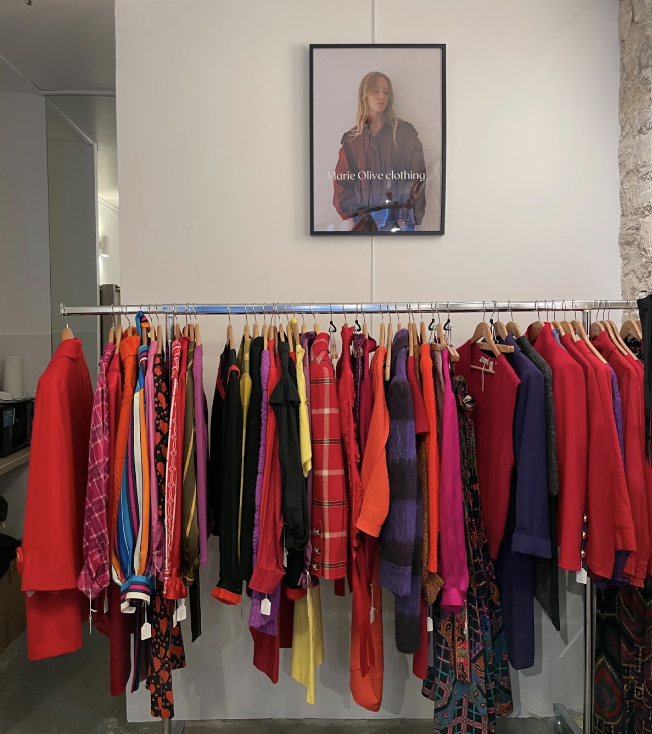How Designer Brands Are Finally Embracing Fashion Resale

Presented as an elusive dream, designer fashion controls the industry's narrative, as runway styles quickly course through a pipeline toward mass-market retail and fast fashion. The latest surge in second-hand clothing markets disrupts this historic "trickle-down" effect. Luxury resale platforms are currently experiencing a boom, especially with big brand partnerships looking for permanent consumer solutions for the fashion industry.
Results from an Instagram poll suggest that 54% of responders shop designer or luxury fashion second-hand, demonstrating the popularity and accessibility of the second-hand clothing market. Websites like Vestiaire Collective, the French website founded in 2009 by Fanny Moizant, are now go-to places for unique "it girl" styles, providing accessible and sustainable designer fashion to a mass market. Recently, Vestiaire Collective started partnering with big-name brands, a surprising but celebrated move that impacts the future of fashion while increasing the credibility and trust of online resale sites.
Fashion resale enjoys a long notable history. In Paris, everyday shoppers flocked to Carreau du Temple in the 19th century to peruse the mounds of worn gowns and suits, establishing a circular fashion cycle long before the conception of haute couture. Beyond the heritage of second-hand resale in France, thrift shops maintained an unsavory reputation for decades, especially as prêt-à-porter (ready-to-wear) continued its accessibility on the mass market. The stigma against shopping second-hand has nearly disappeared thanks to luxury's continued embrace of resale markets and more environmental awareness– results from an Instagram poll reveal that 78% of responders said they purchase second-hand clothing. Both the fashion set and the everyday consumer enjoy the hundreds of independent resale shops and flea markets in Paris, carrying on the tradition that the Carreau du Temple market established long ago.
Image Credit: Instagram/@pucesdeparissaintouenLuxury's embrace of resale aligns with the growth of businesses such as Vestiaire Collective. Fashion conglomerate Kering, who’s portfolio includes Gucci and Balenciaga, backed circular fashion, the supposed antithesis of out-of-reach luxury. The large brand partnership with Vestiaire Collective started in the summer of 2022 when Kering announced they'd purchased a minority stake in the company. Now, large brands are directly collaborating with the retail website. There's plenty of meaning in the recent Courrèges x Vestiaire Collective partnership. Courrèges is a French brand that might not be a household name but holds immense significance– fashion lore credits André Courrèges for inventing the mini skirt in 1964.
Courrèges also popularized the quintessential modern 60s silhouette, embraced by models like Twiggy through ground-breaking campaigns. Resale and the resurgence of various retro trends contribute to Courrèges' recent revival. In many ways, it's the perfect brand to have a high-profile partnership with Vestiaire; it's French, cutting-edge, retro, and young in terms of the target audience. Courrèges isn't in the same price category as Chanel or Dior, but it has a strong brand image and a recognizable logo, making it both desired and accessible.
Image Credit: Instagram/@courreges
According to Vestiaire Collective’s press release, "Courrèges' creations, timeless and durable, align with the values of Vestiaire Collective and its mission to support circular fashion". While perhaps a merely strategic business move, the partnership seems natural. Of course, Courrèges’ items populated Vestiaire Collective's site before the partnership, but, as the online shop notes on their website, the partnership gives extra incentive to Courrèges sellers. Instead of earning cash, sellers receive a Courrèges gift card plus a 15% off bonus on the brand's site. While it might not directly encourage second-hand purchasing, the incentive gives sellers an added reason to recycle their clothing. Courrèges can prevent items from going to landfills and have overall more control of where their used styles end up. It's also an endorsement for second-hand retail by a French brand and a large conglomerate since Kering's CEO, François Pinault's holding company, owns Courrèges.
For second-hand luxury consumers, authenticity remains a primary concern. According to an Instagram poll, 25% of responders claimed they didn't trust online resale sites. Most responders felt small luxury resale businesses were more trustworthy than sites such as Vestiaire Collective. Shirley Pizon is an authentication developer using her fashion expertise to determine the authenticity of clothes and accessories, both in-person and online. She said, “at Vestiaire Collective, it’s real humans who look and determine authenticity, but there are enterprises that are also using technology”.
According to Pizon, fakes are becoming more of a problem, since social media speeds up the fashion cycle. Chanel, Hermès, and Louis Vuitton make up the “Big Three” brands of fakes that sites like Vestiaire Collective find, which their dedicated team has checks and balances in place for. Courrèges isn’t as sought after, but Vestiaire has an elaborate system in place to catch fakes, only made stronger by another brand’s support. The Courrèges partnership adds pressure to the authentication of items but also adds control, since, of course, the brand knows its products best. Trust is critical for the future of resale and its ability to survive the trendy hype it experiences now.
Vestiaire Collective’s partnership with Courrèges signifies a big step in circular fashion; luxury and resale working together in the cycle, as a business collaborating to break fashion’s linear trickle down pattern. While by no means perfect, these newsworthy business deals are a step in solidifying resale in the complicated fashion zeitgeist of modern consumerism.









